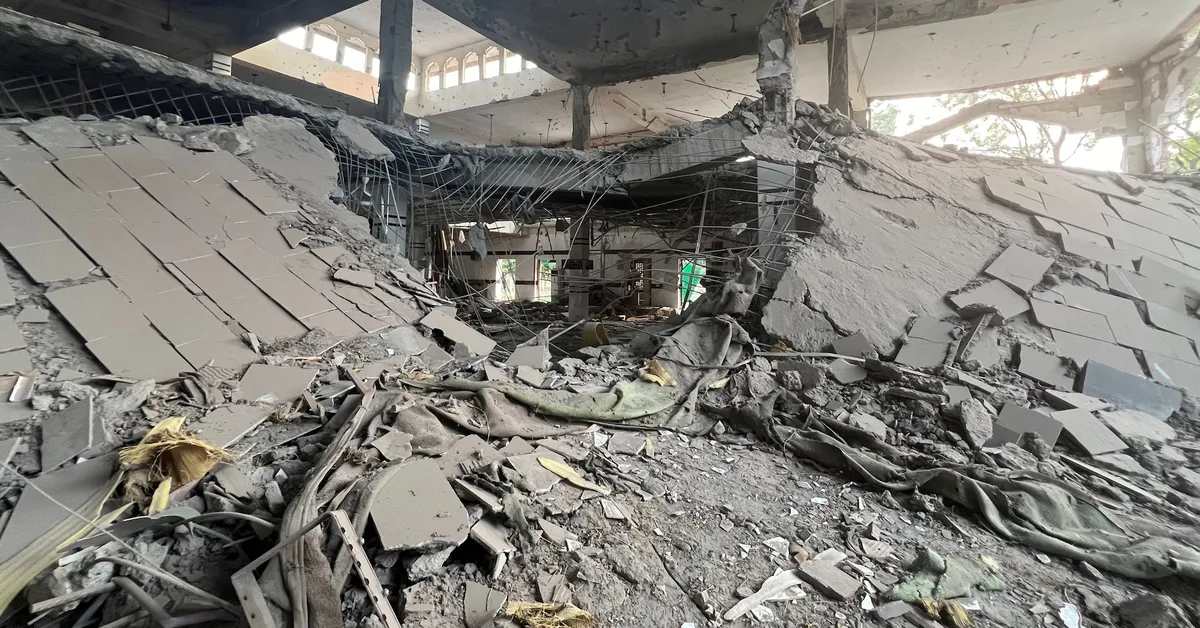
MURIDKE, Pakistan, May 7 (Reuters) - In the early hours of Wednesday, shocking video footage captured a bright flash from a residential Islamic seminary located outside Bahawalpur in central Pakistan. This incident occurred as India launched an attack on its neighbor in retaliation for the tragic killing of Indian tourists in Kashmir. Recently, the seminary had been evacuated of its students due to escalating concerns that it might be targeted by India. However, the family of Masood Azhar, the founder of the Jaish-e-Mohammed Islamist militant group, remained present at the site, as reported by the group.
According to the Pakistani military, ten of Azhar's relatives were among the 13 individuals killed in the strike, which included both women and children. The funerals for the victims drew thousands of mourners to a sports stadium later that day, where they expressed their grief with chants of "Allah Akbar," which translates to "God is Great." In a statement, the group condemned Indian Prime Minister Modi's actions, claiming that his brutality has crossed all boundaries and that the grief and shock experienced by the families are beyond description. They reported that among the deceased were five children, as well as Azhar's sister and her husband.
Despite the chaos, Azhar, who has not been seen in years, and his brother, Abdul Rauf Asghar, who serves as the deputy head of Jaish-e-Mohammed, did not attend the funeral prayers. Following the attack, access to the site was restricted, leaving many questions unanswered. Meanwhile, further north, around half an hour after midnight, four Indian missiles struck a large complex in Muridke over the course of six minutes, according to a local government official. This assault resulted in the destruction of a mosque and an adjacent administrative building, tragically leaving three people buried under the rubble.
The site, which is officially designated as a government health and educational complex, has been associated by India with the militant group Lashkar-e-Taiba (LeT). The Indian government, along with Washington, holds LeT responsible for the devastating 2008 attack on Mumbai, which claimed over 160 lives. Despite being banned, LeT has denied involvement in that attack. Interestingly, the recent missile strike left other buildings on the complex unscathed. A local official noted that normally, up to 3,500 staff and students would be present, but many had evacuated in recent days out of fear that the site would be targeted.
Hafiz Saeed, the leader of LeT and its affiliated organizations, has been incarcerated in a Pakistani jail since his conviction on terror financing charges in 2020. He maintains that his network, which encompasses around 300 seminaries, schools, hospitals, a publishing house, and ambulance services, has no connections to militant groups. In response to the recent strikes, Delhi claimed to have conducted precise attacks on two major headquarters of its militant adversaries, targeting what it described as nine terrorist camps. In its briefing on the attacks, India accused Pakistan of systematically constructing terror infrastructure over the past three decades.
Pakistan, on the other hand, reported that India had targeted six sites, causing the deaths of 26 people and injuring 46, all of whom were innocent civilians. Officials and analysts noted that India's assault on its neighbor represents the most significant military action in decades, fulfilling a long-held objective. In contrast, Islamabad has issued warnings that it would retaliate. Historically, the conflict between India and Pakistan has largely been confined to the disputed mountainous region of Kashmir. However, the recent air strikes in both Bahawalpur and Muridke signify a major escalation in hostilities.
India asserts that seven of its targets were utilized by Lashkar-e-Taiba and Jaish-e-Mohammed, both of which are designated as terrorist organizations by the U.N. Security Council. The attacks were initiated as a direct response to the killing of 26 individuals, primarily tourists, in Indian Kashmir the previous month. Jaish-e-Mohammed claims that it focuses on educational and charitable work within Pakistan, stating that its militant activities are exclusively conducted in India. Conversely, Delhi alleges that the group operates training camps in Pakistan and facilitates the indoctrination of militants who are sent into India.
For decades, the predominantly Hindu nation of India has accused Pakistan of providing support to Islamist militants who target Indian interests, especially in Kashmir. Pakistan, however, refutes these allegations and, in turn, accuses India of backing separatist rebels within its borders, a claim that New Delhi vehemently denies.